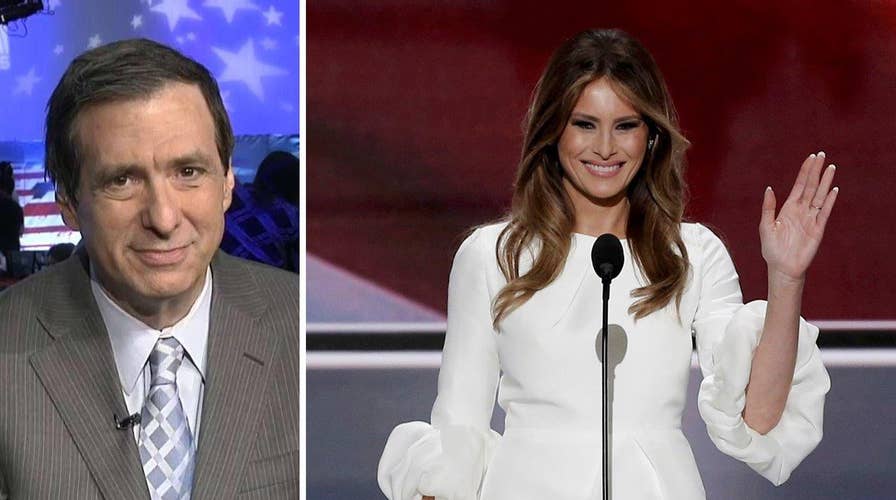Kurtz: Geez! No special prosecutor for Melania
'MediaBuzz' host Howard Kurtz reacts to the Trump campaign denying that passages in Melania's speech were plagarized from Michelle Obama's
Political conventions wash over us with waves of speeches and spectacle, pageantry and punditry, but in the end they’re about a few moments.
Beyond the nominee’s speech, little unscripted scenes become part of an indelible narrative, metaphors for success or failure.
That’s why the Melania Trump speech flap has been distracting, but it’s not the only key development or missed opportunity here in Cleveland.
What people remember is Jimmy Carter chasing Ted Kennedy around the stage and never getting the arms-raised moment. Al Gore kissing Tipper for an inordinately long time. Bill Clinton giving a speech so long he had to joke about it later with Johnny Carson. Sarah Palin mesmerizing the audience with her hockey mom speech. Clint Eastwood weirdly debating an empty chair.
Politico’s verdict: “Trump’s Disastrous Day One.” But it was more of a mixed outcome—a “rocky start,” perhaps, as the Washington Post put it.
Rudy Giuliani gave an impassioned, mostly shouted speech about law and order and terrorism, as well as defending his friend Donald Trump from media defamation. Some loved it and some found it too angry, but viewers of ABC, CBS and NBC barely got to see it. The broadcast networks, which devote a merely one hour a night to conventions, were more interested in getting their own pundits on.
Joni Ernst was supposed to be a featured speaker for the nominee, but scheduling snafus pushed her appearance back after 11 p.m., and the senator’s television audience shrunk dramatically as delegates largely abandoned the hall.
Trump preempted his own convention for a few moments by calling in to Bill O’Reilly while Patricia Smith was on the stage, blaming Hillary Clinton for the death of her son in Benghazi. He might have picked a lull in the proceedings for such a call, given that Smith was a much-promoted speaker.
The #NeverTrump crowd trying to force a roll call vote on changing the convention rules was hyped by some news outlets as creating “chaos” and “mayhem” at the convention. But the effort was so swiftly shut down by voice vote that it became less a moment than the last gasp of a small minority here.
Ironically, Melania’s warm speech struck a very nice opening-night note for her husband. But the less-than-brilliant move by a speechwriter to borrow words and phrases from Michelle Obama’s 2008 convention address created a media furor that wound up overshadowing the former model’s appearance.
Research by the New Analytics Co. shows that mentions of the Melania mess soared beginning with yesterday’s morning shows, hitting 1,000 mentions on national broadcast, cable and local television, more than double the coverage of the prime-time speech itself and about a third more than the night’s theme of Make America Safe Again.
Politicians loosely plagiarize each other all the time. When it’s not so loose, as in Joe Biden appropriating a speech by British pol Neil Kinnock in 1987, it can end a presidential campaign.
The campaign’s insistence that the striking Melania/Michelle similarities were just a coincidence has fueled the media coverage, turning it into a moment that the Trump people didn’t want—and that his wife didn’t deserve.
Of course, the whole flap may quickly be overshadowed by other Cleveland controversies—turning the Melania moment into more of a footnote than a symbol of a convention gone awry.











































